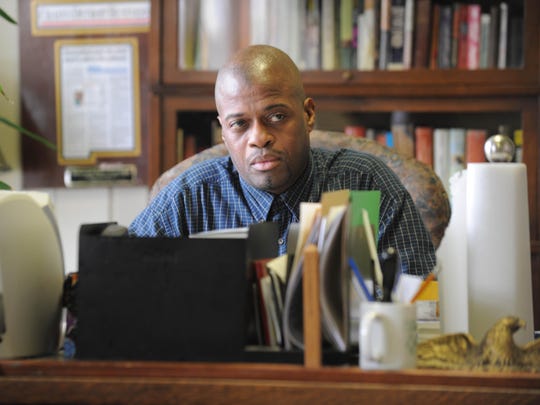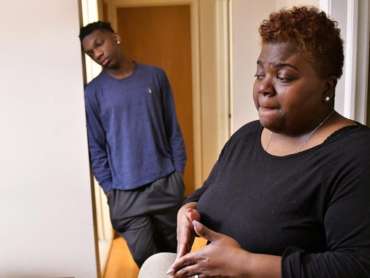George Hunter, The Detroit NewsPublished 12:00 a.m. ET March 19, 2018 | Updated 10:05 a.m. ET March 19, 2018
Deidra Harris-Thomas cradles the cardboard shoebox and delicately peels open the top, unveiling a pair of size 13 blue-and-white Air Jordan sneakers.

She sighs. “My son was killed over these. A pair of shoes.”
Corey Harris-Thomas would have turned 18 this month. He would be entering the stretch run of his senior year at Grosse Pointe North High School. But, nine months ago, he was gunned down in northwest Detroit by a man trying to steal his sneakers.
The high school football running back and punt returner was one of 16 Detroit homicide victims 17 or younger last year. His murder garnered some local media coverage before reporters moved on to the next Detroit tragedy.
While America grapples for solutions to keep school shootings from becoming the new normal in the wake of the Feb. 14 Marjory Stoneman Douglas High School massacre that left 17 people dead, senseless bloodshed is business as usual in cities like Detroit, which last year averaged more than five homicides and 20 shootings per week.
Harris-Thomas is among those who say inner-city violence isn’t being addressed with the same fervor as relatively rarer killings in suburban and rural schools.
“You watch the news and it’s like, ‘somebody got shot on Puritan and Fenkell; oh, well, on to the next one,’ ” said Harris-Thomas, 36, of Harper Woods. “You hear about the problems in Detroit with drugs, and broken homes, and the justice system that keeps letting criminals back on the street, and people just accept it as normal. It’s heartbreaking.”
Nationwide, about 19 children 17 and younger are killed or injured every day by guns, according to Childhood Firearm Injuries in the United States, a 2017 study conducted by researchers with the Centers for Disease Control and Prevention and published by the American Academy of Pediatrics. The study found African-American kids are 10 times more likely to be shot than white children.
“Nobody seems to care until white kids start getting killed,” said Barry Randolph, pastor of Church of the Messiah who organizes anti-violence initiatives and hosts events for the survivors of homicide victims. “It’s like the opioid epidemic: Everyone’s saying ‘oh, we need to do something about this, it’s a health crisis’ — and yet black and brown people in the inner city have been dying from these same drugs for years.
“Where is the national outrage over our inner-city kids being killed? Where are our town hall meetings? As a country, we only seem to pay attention when it happens to white people, or in schools where violence is unheard of. We need our voices to be heard, too.”

Above: The Rev. Barry Randolph hosts events for the survivors of homicide victims. (Photo: Max Ortiz, file / The Detroit News)
In the aftermath of last month’s mass shooting in Parkland, Florida, pundits and lawmakers are scrutinizing gun laws and breakdowns in the criminal justice system that allowed accused shooter Nikolas Cruz to fly under law enforcement’s radar despite repeated warnings about him.
Harris-Thomas said similar problems in Detroit and other cities have long been ignored, including the plethora of illegal firearms on the street, the failure to enforce gun laws, prosecutors striking plea deals for expediency, and a culture in which it’s common for kids to lose their lives over as little as a pair of tennis shoes.
All those issues coalesced to contribute to her son’s death, she said.
“Everyone’s talking about gun control after what happened in Florida, but if they had just enforced the laws that are already on the books, Corey would be alive,” said Harris-Thomas, who has four surviving children.
The year before Corey Harris-Thomas’s death, his killer, Dante Ford, was arrested twice within a month for having illegal guns, only to get probation both times.
Court records show in June 2016, Ford was charged with carrying a concealed weapon. The charge was pleaded down to attempting to carry a concealed weapon, and he was sentenced to 18 months’ probation.

Deidra Harris-Thomas shows the pair of shoes that her son, Corey Harris-Thomas, 17, was attempting to sell when he was fatally shot in June 2017. (Photo: Robin Buckson / The Detroit News)
Wayne County Assistant Prosecutor Maria Miller said: “It is not unusual for (prosecutors) to offer (the lesser charge) when it is the defendant’s first conviction for CCW.”
The following month, Ford was arrested with another illegal gun, and Wayne County prosecutors charged him with possession of a loaded firearm in or upon a vehicle, a misdemeanor. Ford was again given probation, this time for two years.
“He should have been in jail; he shouldn’t have been out on the street to kill my son,” Harris-Thomas said.
Detroit police Chief James Craig said repeat gun offenders aren’t tolerated in other communities.
“You think people could get away with that in Oakland County or Macomb County? It wouldn’t happen,” Craig said. “But in Wayne County, you’ve got repeat offenders who are being let back out to commit more crimes. It’s unacceptable.
“I hear from my officers all the time who tell me they’ll arrest someone with a gun, and the suspect laughs about it in the back of the squad car. They say, ‘I’ll be back on the street in a few days.’ These criminals know there’s no punishment if they get caught with an illegal gun. They think it’s a joke.”
Harris-Thomas said her son’s killer was steeped in the city’s illegal gun culture. “After Corey was killed, I went onto (Ford’s) Facebook page, and he has a bunch of pictures posing with guns, and all his friends had posted pictures with guns,” she said. “He was on probation; why didn’t the probation officer look at his Facebook page? He could have been violated for that.”
RELATED REPORT:School-walkout unity also lays bare student division
The Florida school shooting has prompted a national debate about gun control, although Harris-Thomas said tighter restrictions on gun sales would not have saved her son’s life, and likely wouldn’t have an impact in cities like Detroit.
“You can pass gun control laws, but that’s only going to affect people who follow the law,” she said. “The criminals won’t pay any attention to any laws you pass — and these guys can easily get guns on the street whenever they want to.”
Although there’s been no recent national outcry over inner-city violence, Randolph said more people are speaking up.
“Every year, we do a community march called Silence the Violence, and last year we got more than 1,000 people,” he said. “This year, the parade will go national. It’ll be in Detroit, Chicago, New York, Atlanta, New Orleans, Baltimore and other cities. We’re calling it the Million Children March, and it’s going to deal with all the issues kids deal with when it comes to gun violence, but also immigration, incarceration and poverty.
“The speakers are all going to be young people,” Randolph said. “It’s sad that our children have to open up their mouths to get politicians and big business to listen.”
Randolph said he recently spoke at Birmingham Seaholm High School and found students there had different concerns than those in Detroit.
“It was interesting,” he said. “The kids in the suburbs said they were concerned about school shootings. In Detroit, they’re worried about getting shot on the way to and from school in their neighborhoods.
“Kids getting killed in inner-city neighborhoods is far more likely to happen than school shootings,” Randolph said. “We’ve got people dying every day in Detroit and other major cities, and nobody seems to be paying attention. We’ve got problems that need fixing, too.”
ghunter@detroitnews.com
(313) 222-2134
Twitter: @GeorgeHunter_DN
Killing kids
In Detroit last year, there were 16 homicide victims age 17 or younger.
1. Jan. 3, Jacob Williams, 17, of multiple gunshot wounds
2. Feb. 8, Daniel Winston, under 1, of an abdominal wound
3. Feb. 24, Reginald Rose-Robinson, 17, of a gunshot to the head
4. March 24, Julian Moffett, 17, of a multiple gunshot wounds
5. March 30, Naomi Dunmire, under 1, of blunt force trauma
6. April 3, Ronnie Neal, 17, of a gunshot to the head
7. April 19, Mirricle Dover-Jackson, under 1, of abusive head trauma
8. April 25, Kenneth Cutts, 17, of a gunshot to the neck
9. May 4, Ivy Yurkus, 4, of blunt abdominal trauma
10. May 19, Kass Parker, under 1, multiple blunt force injuries
11. June 6, Corey Harris-Thomas, 17, of a gunshot to the chest
12. Aug. 4, Jarnesha McWilliams, 14, of a gunshot to the chest
13. Aug. 30, Jerrick Jefferson, 1, of multiple stab wounds
14. Sept. 16, London Thigpen, under 1, of abusive head trauma
15. Dec. 6, Kyeri Boyd, 3, of a gunshot to the head*
16. Dec. 14, Nasear Ferguson, under 1, of abusive head trauma
*self-inflicted
Source: Wayne County Medical Examiner’s Office
Be a friend
Deidra Harris-Thomas says she’s doing her part to try to quell inner-city violence by establishing the “Be a Friend” Foundation in the name of her son, Corey Harris-Thomas.
Entrants must be seniors at Martin Luther King, Loyola or Grosse Pointe North high schools, and are required to write an essay about what it means to be a friend. The first place winner gets $1,000, and second- and third-place winners receive $500 and $250, respectively.
Submissions must be received by email to chtfoundation@gmail.com by 11:59 p.m. May 1.
Harris-Thomas said she picked King and Grosse Pointe North because her son attended those schools; and Loyola because her son was killed near the facility.
According to the foundation’s mission statement, the aim “is to educate, assist, council and mentor at-risk males ages 15-23 … to deter and prevent gun violence, psychological instability, and self-destructive behavior through the development and use of hands-on outreach programs.”
“I can’t make sense of what happened to my son,” Harris-Thomas said. “I won’t ever make sense of it. I’ve come to terms with that. All I can do is try to spread awareness, and tell kids: Listen to your parents. Try to do the right thing. And if you know something is wrong, don’t just go along and let it happen. Say something.”

